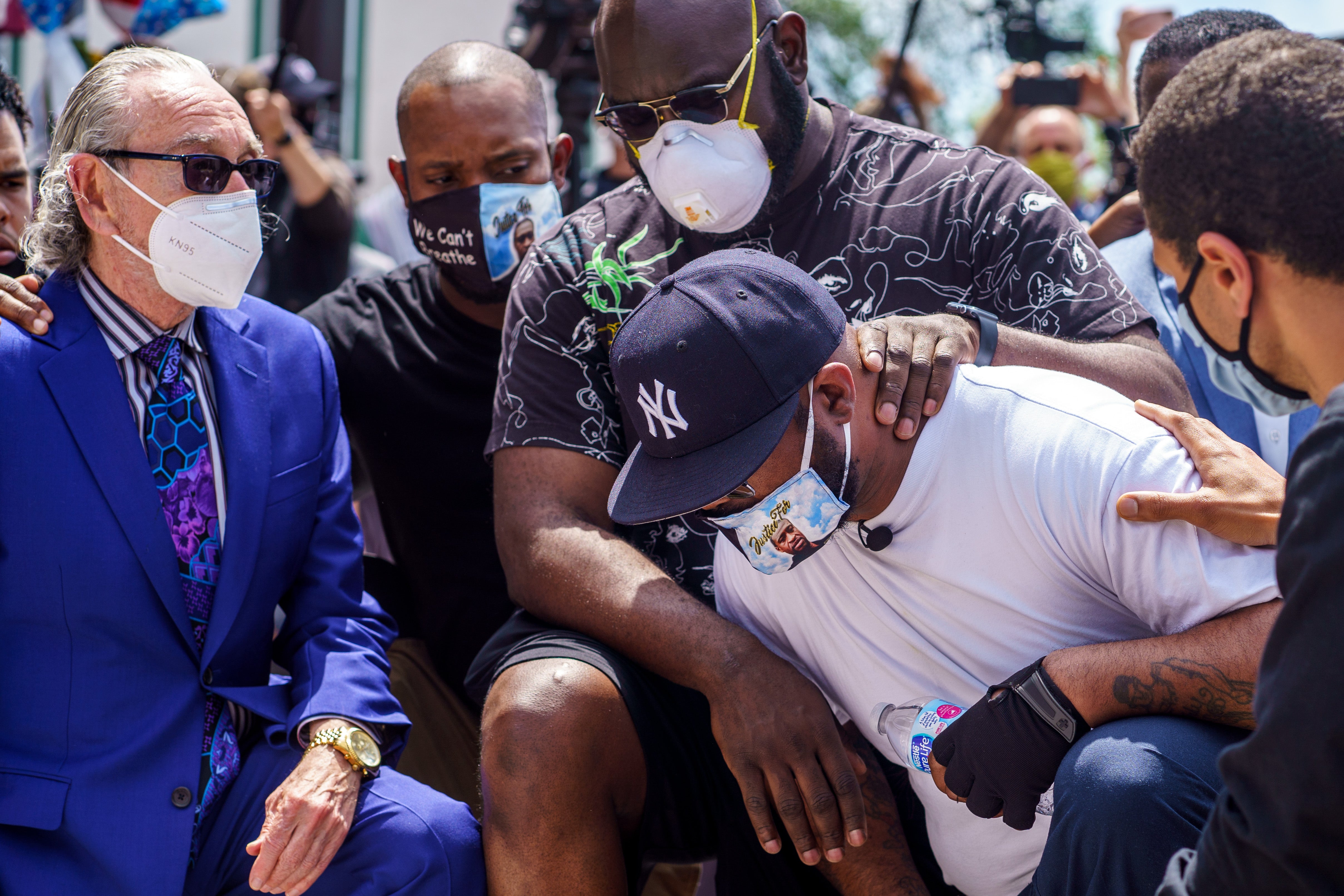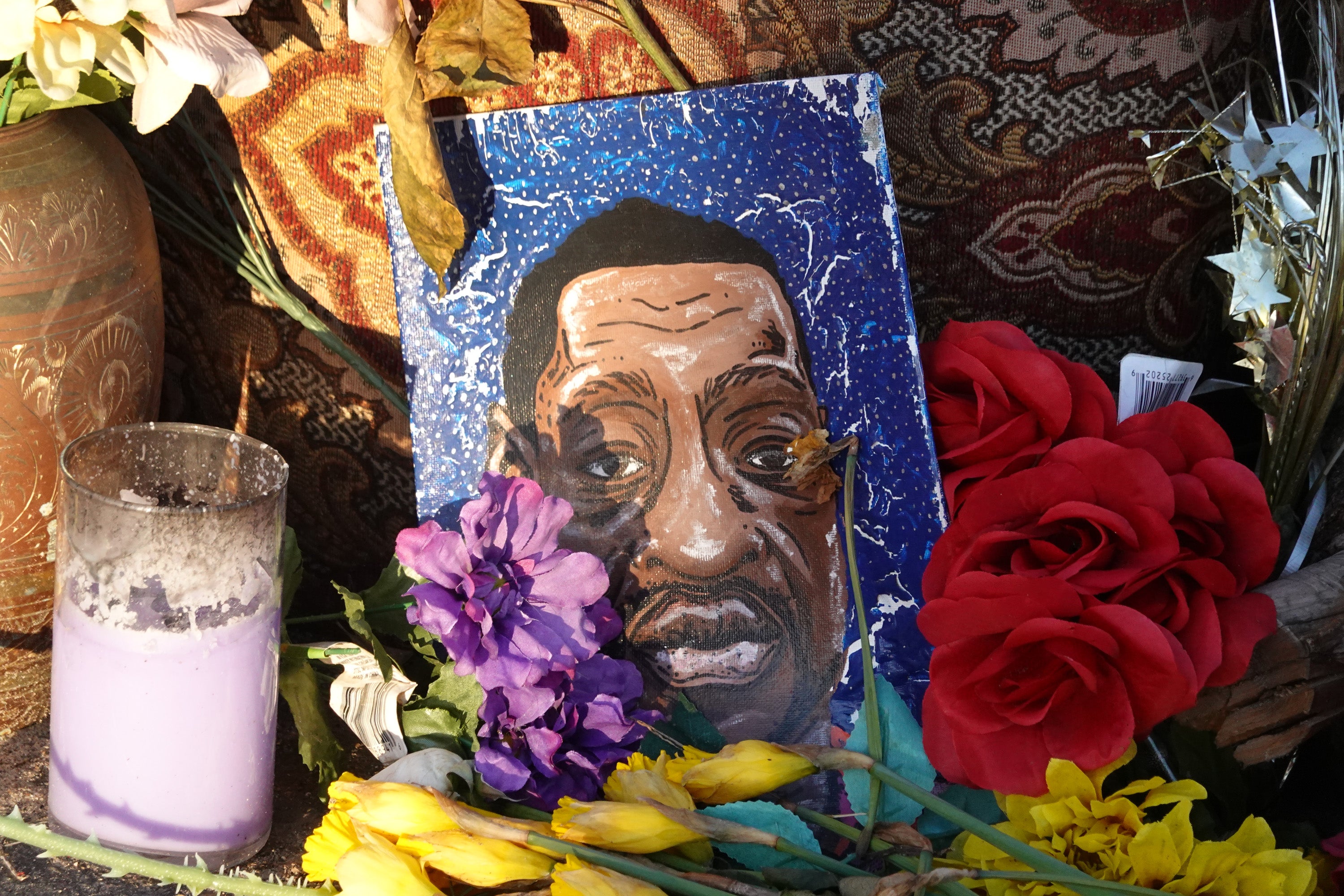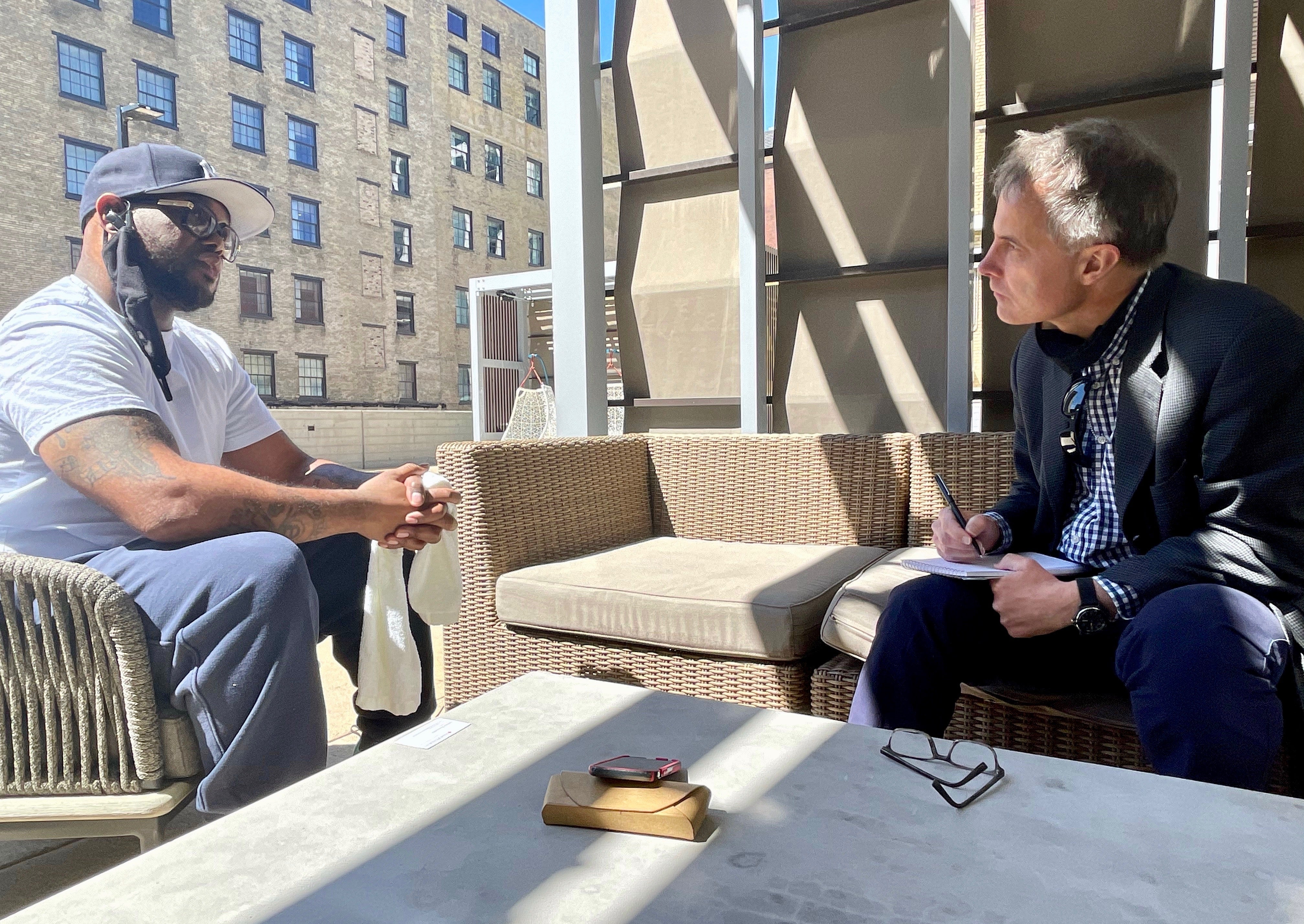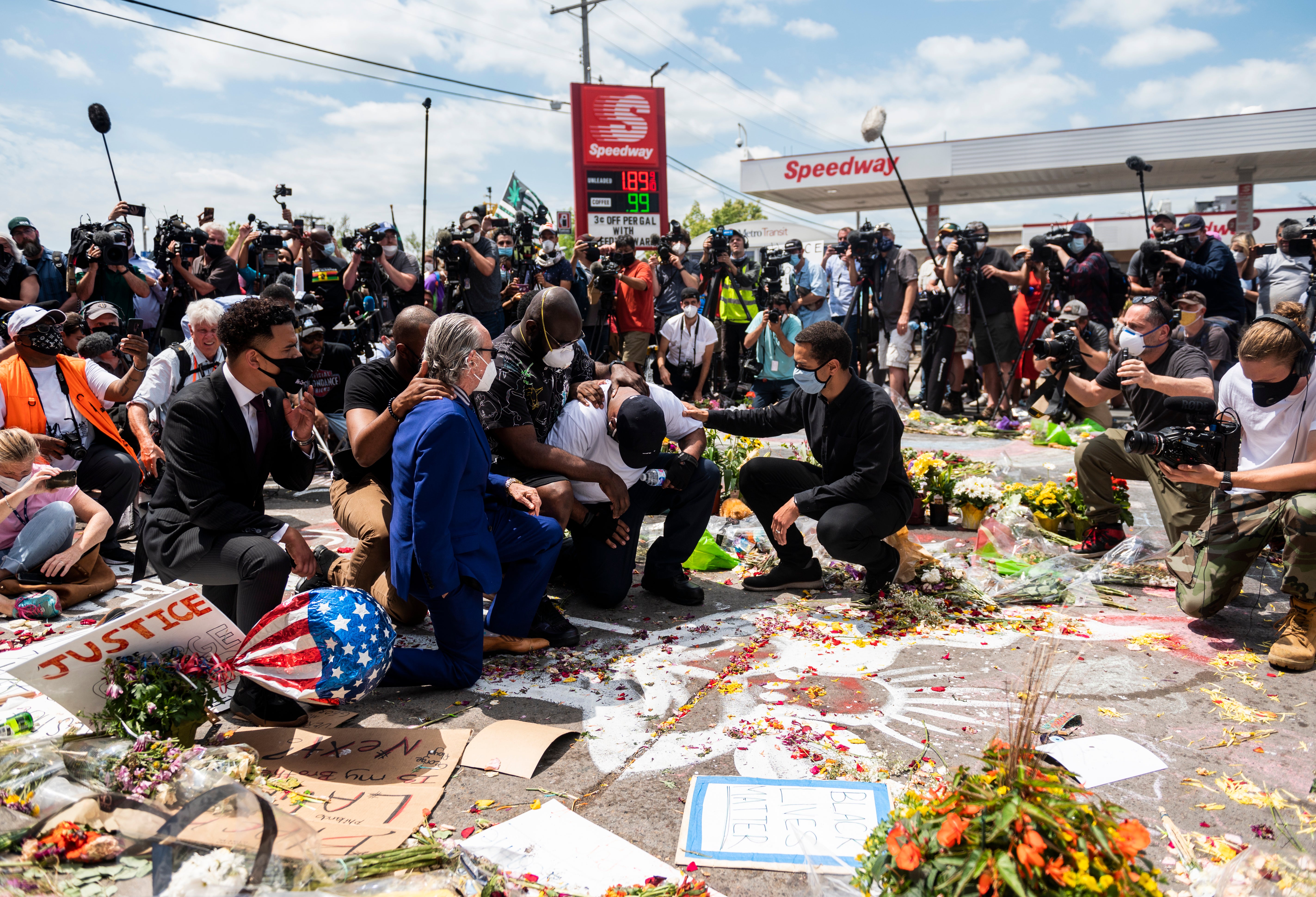George Floyd’s brother interview: ‘I have to walk where he can’t walk, talk where he can’t talk, love where he can’t love’
Q&A Terrence Floyd tells Andrew Buncombe about his pursuit of justice and a surreal year


George Floyd’s brother has made an impassioned plea for peace as a jury prepares to consider the case against an ousted police officer charged with his murder.
Terrence Floyd said that for former Minneapolis police officer Derek Chauvin to be convicted of murder would be a milestone and a break through, not just for his family but for the struggle for racial justice.
Yet, he said no good would happen if people responded to a not guilty verdict with violence or destruction.
“You have a right to be angry. You have a right to protest and let your voice be heard. And to express that anger. But don’t express it in a violent way, express it in a peaceful way.”
He added: “Show the people out there that think we’re animals, we’re not. We’re just angry, and we want to be heard. We have a right to be heard. This is my message – keep it peaceful.”
Mr Chauvin is charged with second-degree murder, third-degree murder and second-degree manslaughter. He has pleaded not guilty.
On Monday, the jury is to hear closing arguments from both the prosecution and the defence, before it is sent away, sequestered and told to consider its decisions.
Last week, judge Peter Cahill turned to the jurors and warned them to pack a bag when they returned on Monday.
Below is a lightly edited transcript of the conversation:

Q: Tell me what it’s been like this last year. The last time I saw you in person, everyone was down at Cup Foods, and you were going for the first time, to see where your brother was killed. An awful lot has happened in those 11 months.
A: The last year, like I said, it’s been surreal, because you look at what’s going on with my brother. And then you look at some change that’s happening, but not a lot of change. Basically, I would say it’s been like a mental roller coaster, because one minute I’m dealing with my brother, the next I’m dealing with something else that’s going on within the system. So for my culture, African Americans, this was a mental roller coaster.
Q: Do you feel a pressure and responsibility to speak your truth, in a way that perhaps you didn’t feel obliged to before this happened?
A: I do feel like I was thrust into this, but as I keep walking in my purpose. I’m seeing that I do have a voice and it’s necessary. So when I first started, I was nervous, I didn’t want to talk, I didn’t want to be in front of cameras. I just wanted to say what I had to say and leave. Now, I feel compelled to talk and let my voice be heard because I want to say what some people are not able to say, like what my brother is not able to say.
…I have to walk where he can’t walk, talk where he can’t talk, love where he can’t love. And that’s what I’m going to continue, and to carry out.”
Q: Do you worry about that pressure?
A: I was just talking to a friend of mine this morning and she reminded me of the saying ‘Heavy is the head the wears the crown’ And you know, sometimes I feel like I want to take the crown off because it’s such feel like it’s weighing me down, but I can’t. I just can’t. And that’s why I have my friends around my circle around me [so] that when I feel like taking it off, they kind of tilt it back up, keep it on.”
Q: Let’s bring it forward a little bit to the last month. You know you’ve been going into the trial and watching a lot of it. What’s that been like?
A: That has been intense because the last year, I’ve been seeing this particular person, Chauvin, on TV. But to see him up close it brings on a whole bunch of emotions.
You know there’s ‘Why?’ factor. ‘What was on your mind?’ But you can’t get to him to talk to him about that. But that just my curiosity. It’s been intense to relive all this all over again, and to see him, in arm’s reach, is it’s just an intense emotional feeling.
Q: Has there been any outreach or contact from his family to yours at all. No apology, no ‘sorry that this happened, it’s not what I meant?’
A: No. Not to me
Q: Does that surprise you?
A: No. It doesn’t surprise me at all. Because [there are] too many emotions going on right now. They’re probably over thinking that we hate them, and so nobody says nothing to nobody. So it doesn’t surprise me that nobody’s communicating like that.
Q: You said there was a moment when you were actually in the same corridor as Mr Chauvin?
A: We were in the court and it was recess. And I came outside court through a vestibule. And I was sitting down, and I guess he walked out. I stood up just to stretch my legs but he came out at the same time. And you know, I got a question [afterwards from my friends] ‘Did I want grab him and put my knee or his neck?’ And I said no, I didn’t, I didn’t feel that way. I felt disgusted, but I didn’t feel like doing any harm to him because I didn’t think it would prove a point. It wouldn’t prove no point.
Q: What will the verdict mean for your family?
A: The right verdict? It would mean a lot for my family, but it would mean even more to my culture. It would mean a lot more to my culture because we’ve been in this oppressed state for so long, that if the verdict’s what we’re hoping for, we’re praying for, it would just be a sigh of relief that we will actually see change for real. Not somebody just talking about change, we’ll actually see it.
Q: Let’s just imagine for a second the verdict is not what you want. There’s a real danger things could get very crazy in the Twin Cities?
A: Long story short, it could get crazy, but that’s where I feel my voice my voice comes in. Because I am his brother. And at the end of the day, nobody, feels the pain I [feel] and that my family feels.
The world is going to be very upset. We see this. That’s not something I’m saying is gonna happen, we see this, there’s gonna be upset. I feel like my purpose is to keep the focus, because if we if we start rioting and we start tearing up stuff and doing the wrong thing, then what are we really proving? So I feel like I’ll have to speak, and just keep trying to keep the peace and keep the love going.
Q: So your message would be to anyone, regardless of the outcome, that you have to respond in a way that is peaceful?
A: Right, I’m quite sure it’s gonna be some protests, I’m quite sure it’s gonna be people being very boisterous, which is, which is a given, you’re angry. But like I said from the beginning, tearing up stuff and and killing the cops or whatever like that, is not the answer. Because that’s just adding fuel to the fire. And that would actually be showing people what they think of us anyway. They think we’re animals. And they’ll be ‘I told you so. Look at that’. Don’t let them get the upper hand. Play a smart strategy.
Because you’ve got to understand, too, they’re just doing a job – the prosecutors, the defence team, the judge, the jury, they’re just doing their job.
So you’ve just got to be strategic and be smart. Don’t don’t go off emotions. Don’t react off emotions.

Q: How did you feel when you learnt Daunte Wight had been killed?
A: Ahh, it was just like, not again. And then when you see his age. He’s only two years older than my son. You know that could have been my son. It could have been my friend’s son. And you would think that the police department would be on point and try to do everything in the right way, because this case is on, so they don’t want to get any more drama thrown their way. But it’s not happening. That just disturbs my spirit, my soul because it’s not them dying, it’s our people dying. It’s people dying. Period. I don’t even want to say “our people”. Just people.
Q: Some have suggested that but for the killing of George Floyd and the trial of Derek Chauvin, officer Kim Potter would not have have been charged over Daunte Wright, at least not so quickly.
A: I think it played a part. You know, when I think about it, I think it played a big part. Because this actually happened as the trial is going on. So then for this quote unquote accident, which I really don’t think it was.
Q: Why not?
A: I thought it was just in New York, where I’m from, where Tasers were a different colour. One is yellow, and the gun is black. I learned they are [also] a different colour here. So, I definitely don’t think it was an accident, because she had the weapon drawn, she had enough time to look and see the colour. So, if you didn’t see no yellow. You should have put it in [away]. So I don’t I really don’t think it was an accident.
Q: So you think she intentionally wanted to shoot him?
A: I don’t think it was intentional, but it wasn’t an accident
Q: Given what happened to your brother will be with you forever, what would you like to see your movement achieve?
A: Like all the other civil rights leaders – equality. We have different skin colours, we still bleed the same. All our blood is red. We’re all human. So, equality. Because right now, one race thinks they’re better than the other. But there’s no black race, or white race, just the human race.
Q: How are you going to overcome centuries of racist history?
A: Growing up and learning with my faith, we’d say ‘One can change a thousand. Two can change ten thousand. So that’s what I am trying to do. I’m trying to put my two cents in the pot. Behind all the other ones that came before me.”
Q: Do you feel there is a genuine care and concern, and love for your brother from white people in the United States?
A: Yes, I do.
Q: What could politicians do to help more, given Joe Biden and Kamala Harris are in the White House?
A: That’s a very intense question. From my history, I think the presidents need to focus on America. They’re focusing on all the other countries and what’s going on there, and there’s chaos here.
Q: That was Donald Trump’s message right – America first? Yet his critics accused him of bigotry and racism. What do you think of Trump?
A: I don’t want to talk about him. He’s no longer in office. I don’t need got talk about him.
Q: I think you’re saying you’d like Mr Biden to focus on more on the US and the issues here?
A: Yes, while you’re dealing with everything else, you know, help us too. Because I have plenty of people who say ‘where’s Biden now’, ‘where’s Kamala Harris now’. Well, I’d like to know.
Q: Have they been in touch since [George Floyd was killed]?
A: Not to me.

Q: What about President Obama. Have his people been in touch?
A: I’m still in awe of when he retweeted me from before when I was down here. I’m still in awe of that, so if you mean did they reach out, I think that’s a reach out. That’s a big reach.
Q: In terms of securing racial justice and pressing for police reform, are there specific policies you would like to push, or are you focused more on raising awareness.
A: “I’m trying to raise awareness because you could go to the politicians and you can talk to the politicians. They can do what they can do. But at the end of the day, it’s the people that really run the country.
I started my organisation in New York and we’re going to be focusing on police reform, and community work with the young people, because that’s where that’s where it starts. You know, we try to try to build up the young people. That way, when they get to a certain age, they have the training and the know-how to achieve in life.
Q: There are another three trials potentially coming up. Will you be here?
A: That’s the plan. I don’t think it will be more intense than this one, because this is the actual one of the police officer that was on my brother. So I don’t think it would be as intense, but it will be intense.
Q: Given you are aware the whole world is watching right now, what message might you have?
A: It’s the old cliche, or the old saying, don’t judge a book by its cover. You’ve got to read the book, get to know the person. And you know, that’s what this case is about is – the person versus what other people perceived him to be, because of his past. When they see me, don’t just see a big guy, [and] get scared. No, get to know me. Because Black people are not animals.


